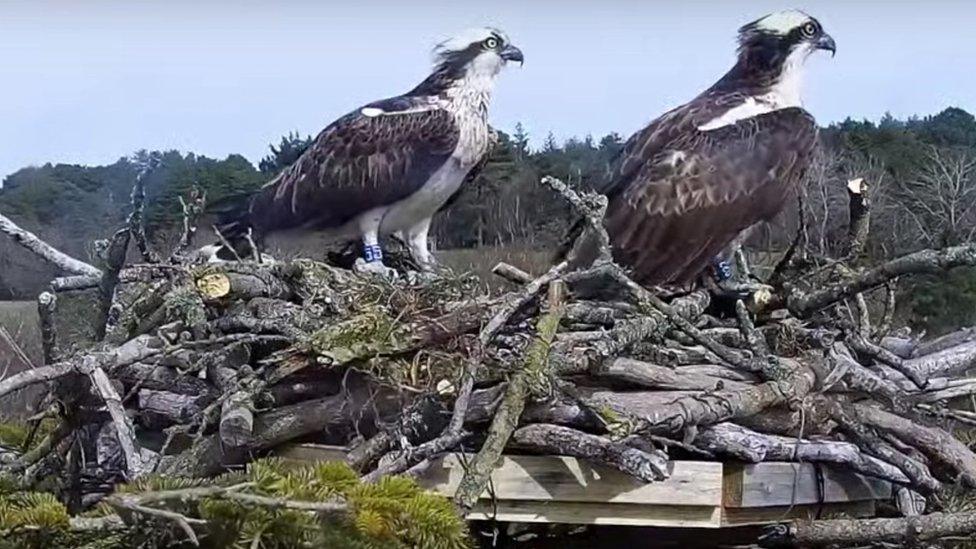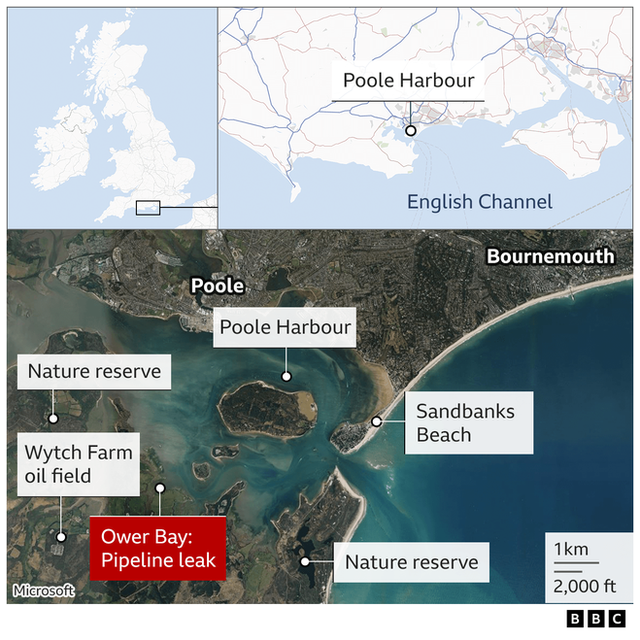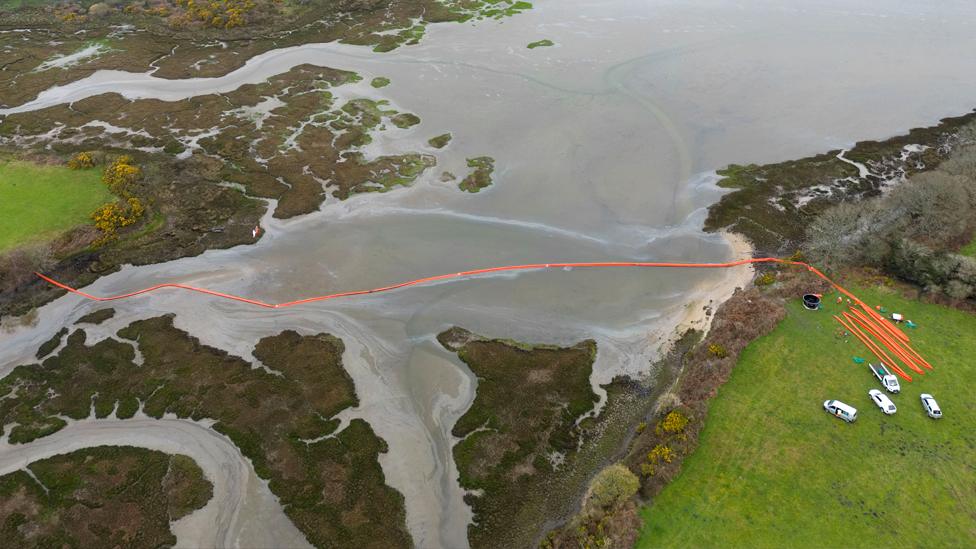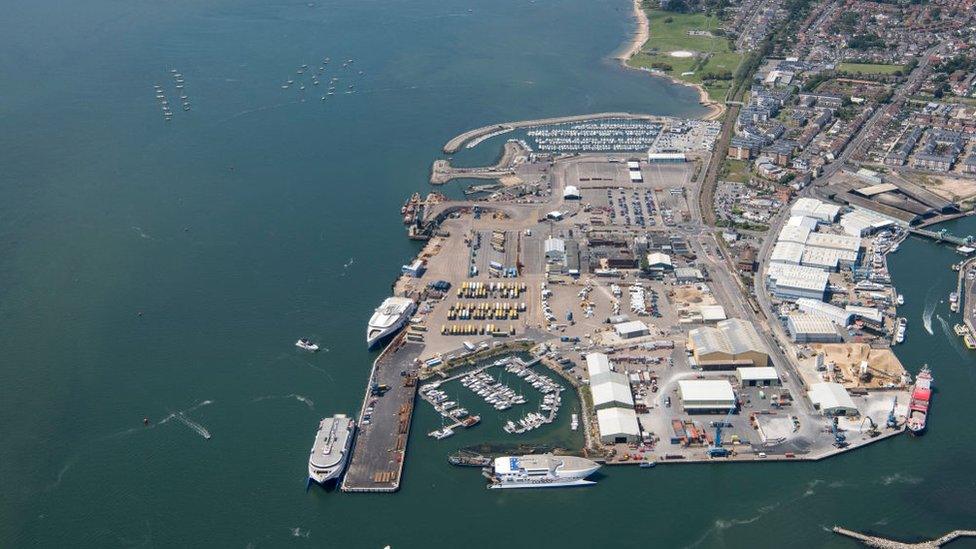Poole Harbour: RSPB reports oiled birds after pipeline leak
- Published

The harbour is home to an osprey reintroduction programme, and a male returned to the site at the weekend
An oil spill in Poole Harbour could have a long-term impact on nature reserves in the area, environmental charities and experts have warned.
About 200 barrels of reservoir fluid, including oil, leaked from a pipeline at an onshore oil field on Sunday.
It is the largest natural harbour in Europe and about 5,000 acres of it is designated a Site of Special Scientific Interest (SSSI).
The RSPB has reported "oiled birds" had been spotted around the bay on Monday.
The charity said it was too early to fully assess the damage to wildlife but was "very concerned" about the effect on migrating birds.
Peter Robertson, senior site manager at RSPB Arne which borders the harbour, said: "We have received reports of oiled birds in the area and we are monitoring the situation closely."

The harbour's saltmarshes and mudflats are a feeding and breeding ground for seabirds including spoonbills, avocets and black-tailed godwits.
It was the first such site to specifically include subtidal areas to protect the feeding areas of internationally-important term areas, and was increased in size in 2019.
The harbour is also home to an osprey reintroduction programme, aiming to establish a breeding population of the fish-eating birds of prey after 200 years.
Conservation group Birds of Poole Harbour said it was "incredibly worrying" the leak from Perenco's Wytch Farm oil field had happened "right in the middle of such an environmentally-important area".
The harbour hosts nationally and internationally important numbers of wetland birds each winter as well sandwich and common terns which nest on Brownsea Island each summer, it said.
Aerial footage shows a large boom across Poole Harbour the day after the leak
"Right now we're in that important transition period where our winter birds are leaving and our summer birds are arriving, many of which use the southern shore of the harbour for feeding, nesting and hunting," the charity explained.
Earlier this month, its Wetlands Bird Survey logged 5,450 birds along the southern shore in the spill area.
A male osprey, thought to be from a breeding pair, returned to the site at the weekend, having successfully hatched two chicks last spring - although one later died.
Ospreys exclusively eat fish, feeding on grey mullet, flounder and bass in the harbour during spring and summer, the charity said.
Over the next few weeks both sandwich and common tern would also be arriving back from their wintering grounds to nest on Brownsea Island and would fish in the harbour to feed their young.
But not only are there concerns over birds coming into physical contact with the spill, there is also a risk it could settle on the harbour shorelines and impact marine invertebrates.
"The long-term effects worry me more than the spill itself," said naturalist and wildlife photographer Steve Trewhella.
"Not all pollution floats, big tides or stormy weather can result in it eventually settling on the seabed," he explained.
'Extremely serious'
"This can result in contamination of species that live on the floor of the harbour, such as worms, crustaceans, molluscs and other invertebrates - as well as many fish species.
"The reason the harbour is a haven for birds, seals and even otters, is this food source - if it becomes contaminated or lost the results can be devastating."
Mr Trewhella warned that if the contaminant does float, it could wash up on the beaches, mudflats and saltmarshes, which would in turn be contaminated "along with anything that lives there".
He said: "Only time will tell if this event is a concern but by then it will be long-forgotten and everyone will be friends again, especially those who have a vested interest in binning off sustainable alternatives while pumping oil and gas out of a site that has blighted our once beautiful county."
Prof Malcolm Hudson, from the University of Southampton, said Poole Harbour was especially sensitive and internationally protected for its wildlife but said there would also be an impact on people.

Perenco said the leak was "quickly stopped and contained"
He explained: "There's a big shellfishery, and tourism is a big part of the local economy. Not only is this potentially a serious environmental incident, it illustrates the risks we take if we place infrastructure like oil pipelines in such sensitive locations."
Martin Barnes, marine response expert at environmental management company Ambipar, said the leaked reservoir fluid was a brine mixture that contains an element of physical oil.
The "unattractive sheen" on the surface would dissipate through evaporation during daylight hours but some oil deposits could be left behind on solid surfaces, mammals, aquatic life and humans that have been in contact with it, he said.
Mr Barnes continued: "The deployed booms should contain any oil on the surface so it can be recovered.
"The brine element [water] of the discharge is also a hazard to the environment that will be very difficult to deal with as it will become diluted by the sea water, making it impossible to be recovered at sea."
Richard Hill, from the Marine Conservation Society, said: "I am shocked and saddened to see yet another oil spill in UK waters. We need better protection for sensitive sites such as Poole Harbour.
"This incident should be considered a warning to adequately protect sensitive sites and ensure that oil industry infrastructure is up to the task. We cannot allow these spills to continue to happen."
Franck Dy, Perenco UK's Wytch Farm general manager, said: "Any spill is an extremely serious matter and a full investigation will be launched to ascertain what happened in Poole Harbour.
"It is important to stress that the situation is under control, with the discharge of fluids having been stopped and the spill is being contained."

Follow BBC South on Facebook, external, Twitter, external, or Instagram, external. Send your story ideas to south.newsonline@bbc.co.uk, external.
- Published27 March 2023

- Published27 March 2023
